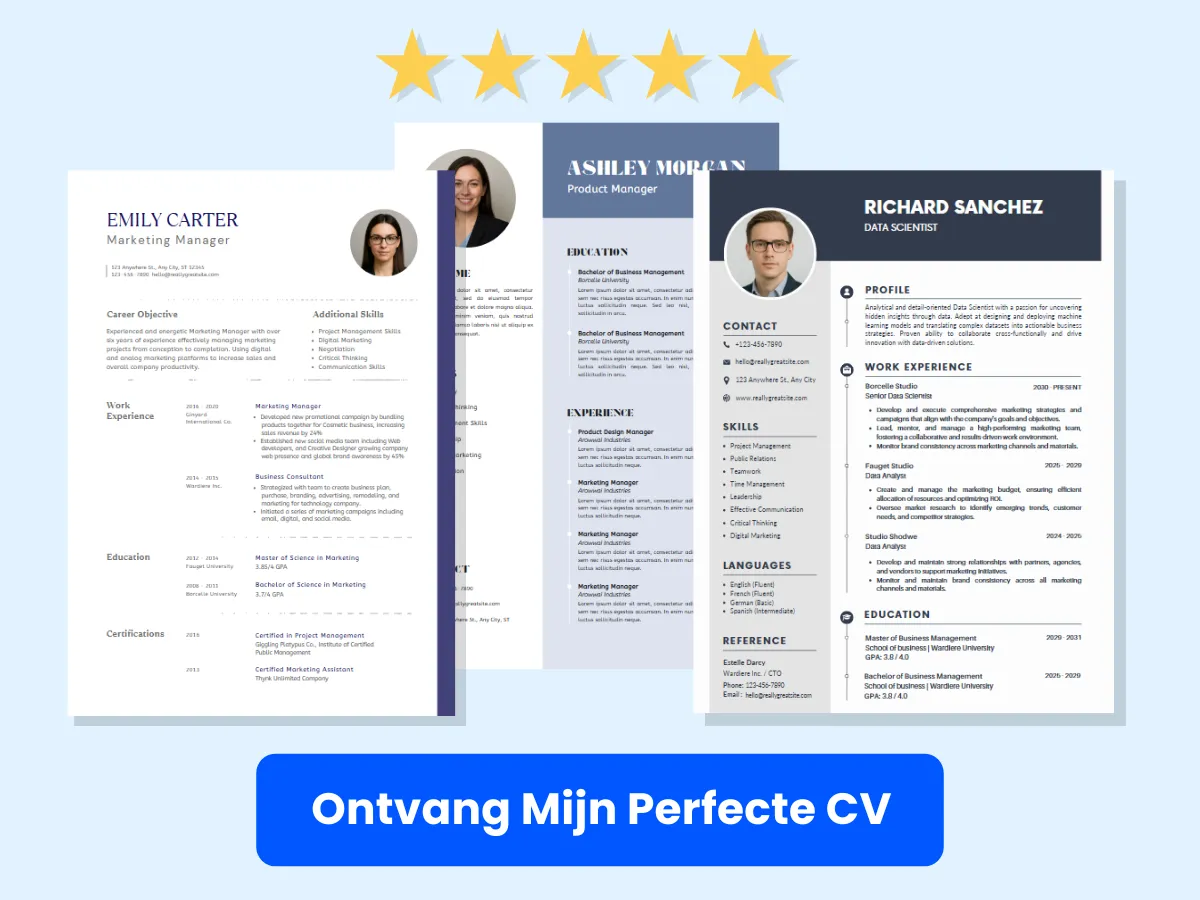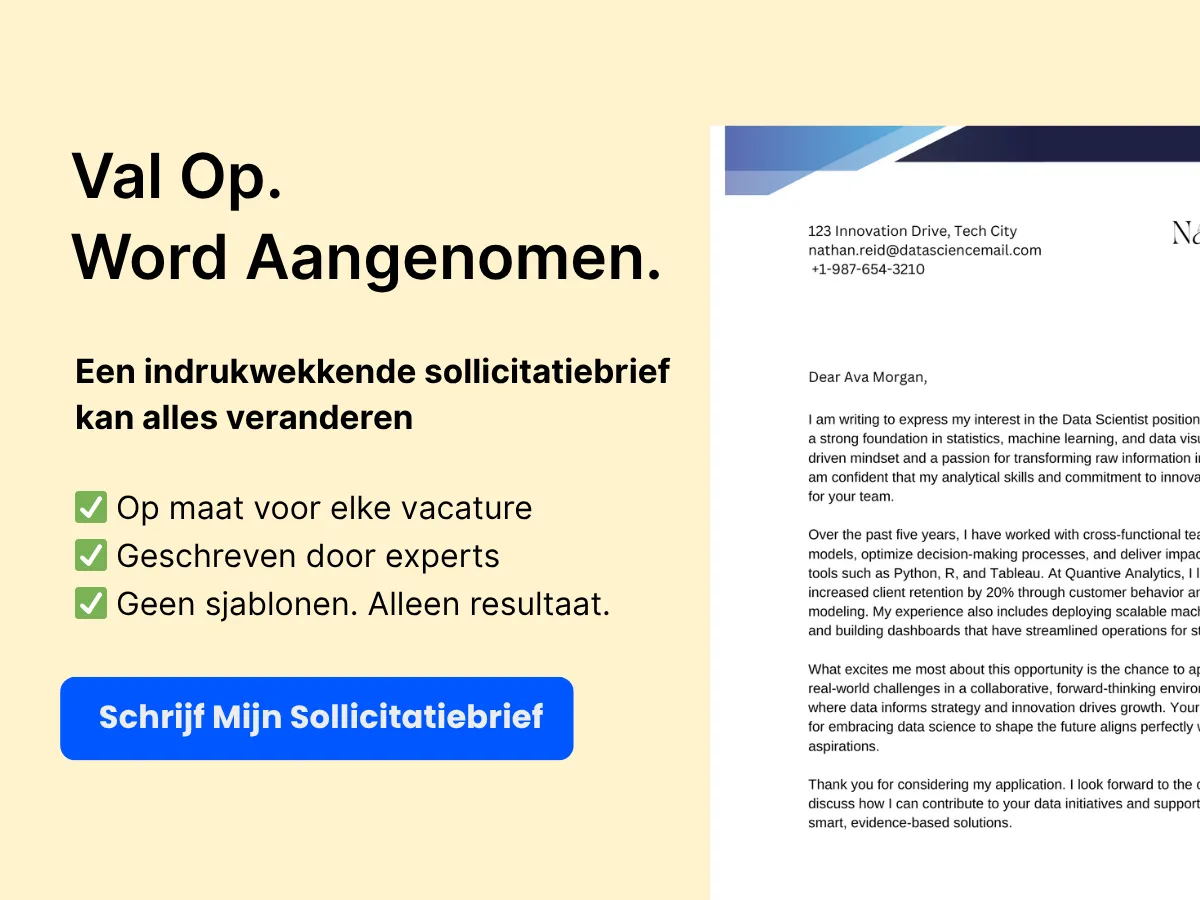Op de huidige dynamische arbeidsmarkt is het waarschijnlijk dat velen van ons op enig moment tijdens ons professionele leven een carrièreverandering zullen meemaken. Of het nu om persoonlijke of financiële redenen komt of gewoon om de wens om nieuwe kansen na te streven, het navigeren door een carrièreverandering kan een uitdagende en overweldigende ervaring zijn. Daarom is het essentieel om de do’s en don’ts van loopbaantransities te begrijpen om succes op ons nieuwe pad te garanderen.
Dit artikel dient als leidraad voor diegenen die een carrièreswitch overwegen. We onderzoeken het belang van het navigeren door deze transitie en geven uitvoerbaar advies over wat u wel en niet moet doen om uw kansen op succes te maximaliseren. Van het nemen van praktische stappen tot het beoordelen van uw overdraagbare vaardigheden en het zoeken naar groeimogelijkheden tot het vermijden van veelvoorkomende fouten: we behandelen alle essentiële aspecten van het maken van een succesvolle carrièreverandering.
Dus of je nu het gevoel hebt vast te zitten in je huidige baan of toe bent aan een nieuwe uitdaging, lees verder en ontdek de do’s en don’ts bij het maken van een carrièreswitch.
Zelfevaluatie en het stellen van doelen
Als het gaat om een carrièreverandering, is zelfevaluatie van cruciaal belang om ervoor te zorgen dat de genomen beslissing de juiste is. Het maken van de verkeerde keuze kan kostbaar zijn, zowel financieel als emotioneel, en tot ontevredenheid en frustratie leiden. Met een zelfevaluatie kan een individu zijn sterke en zwakke punten, interesses en waarden identificeren, waardoor hij of zij het meest geschikte carrièrepad kan bepalen.
Het uitvoeren van een zelfevaluatie omvat het evalueren van iemands opleiding, vaardigheden, werkervaring en persoonlijke voorkeuren. Individuen kunnen verschillende hulpmiddelen en technieken gebruiken, zoals persoonlijkheidstests, vaardigheidsbeoordelingen en SWOT-analyse, om een beter inzicht in zichzelf te krijgen. Het doel van de zelfevaluatie is om een duidelijk beeld te creëren van waar men staat, wat men te bieden heeft en waar men naartoe wil. Met deze informatie kunnen individuen weloverwogen beslissingen nemen en carrièreveranderingen vermijden die niet in lijn zijn met hun doelen.


Na het uitvoeren van een zelfevaluatie is het essentieel om realistische en haalbare doelen te stellen. Doelen fungeren als een routekaart die individuen naar hun gewenste toekomst leidt. Bij het stellen van doelen moeten individuen rekening houden met hun ambities op de lange en korte termijn, deze prioriteren en een actieplan opstellen om deze te bereiken. Realistische en haalbare doelen zijn essentieel om ervoor te zorgen dat individuen niet overweldigd of ontmoedigd raken als de zaken niet gaan zoals gepland.
Successful career change involves self-assessment and goal-setting. Conducting a self-assessment helps individuals identify their strengths, weaknesses, interests, and values, which helps them make informed decisions. Setting realistic and achievable goals helps individuals create a clear roadmap towards their desired future, ensuring success and satisfaction.
Researching New Careers
As you make the decision to switch careers, research is an essential first step to ensure you make the right choice. The importance of researching new careers cannot be overstated. It enables you to gain a deeper understanding of potential career paths, identify the required skillset for each one, gain insights into the industry, and assess the potential salary and job demand.
How to Research Potential Careers
Finding the right career can be a challenging endeavor, but conducting thorough research helps yield meaningful results. One way to start is by taking an assessment test to determine your personality type, areas of interests, and strengths. Informational interviews, attending job fairs, conducting online research about your desired field are additional methods to obtain the necessary information for your research.
Analyze how your qualifications align with the qualifications required for the career of interest. Then evaluate your current skills and abilities that can transition to the new career field. Consider any necessary additional training or education needed to improve the qualifications the new career requires.
Identifying Skills Required for New Careers
Once you’ve identified potential career paths, it’s essential to figure out the required skills for each of those. Look at the job descriptions in job boards or corporate websites for the roles you’re interested in. Take note of the qualifications, technologies, and experiences required, and assess that against your current skill set. Gap analysis is crucial to determine the training and skill enhancement required to match the required skills for the new career.


Assessing Potential Salaries and Job Demand in the New Career
Determining the expected salary range and job demand is crucial when researching new careers. Review external resources that provide information regarding the average salary in that field or region. It is equally essential to research the available job opportunities across locations, including entry-level positions and upper-level positions.
It’s also necessary to keep in mind the overall job projection of the career path. Talk to industry insiders or read recent news or industry reports with statistics on the availability of new jobs in the industry or any forecasts of the industry’s future.
Thorough research is critical to making an informed decision about a career change. By identifying what’s important to you in a job, researching and assessing various career paths, and analyzing specific qualifications and skill gaps, you can identify a new career that’s the right fit. So, take your time and make sure you’re happy with your new career path.
Networking
In the process of transitioning into a new career, networking is an essential ingredient for success. It’s a powerful tool that can help you increase awareness of your skills, find job openings, get advice, and open doors to new opportunities. Therefore, it’s essential to embrace the importance of networking in your career change journey.
Importance of networking in a career change
Networking allows you to build relationships and connections that can help you advance in your career. It is an effective way to meet new people, including professionals who work in your desired industry or company. Additionally, networking helps in gaining an understanding of the industry’s culture, challenges, and trends that are crucial during a career change. By surrounding yourself with people who have a wealth of industry-specific insights, you’ll also increase your chances of gaining valuable referrals, recommendations, and eventually job interviews.


How to build new connections in the industry
To build new connections in your desired industry, start by identifying the relevant events, trade shows, seminars, and conferences you could attend. Such events are excellent opportunities to meet industry professionals with similar interests, making it easier to engage and make meaningful connections. Networking events enable you to start conversations, collect business cards, and follow up with people afterward to develop the relationship further.
Another way of building connections is by volunteering for industry-related activities. Participating in volunteer activities provides you with opportunities to work alongside industry professionals, which can lead to meaningful connections.
Tips for reaching out to industry experts and potential employers
Reaching out to industry experts and potential employers can feel daunting, but it doesn’t have to be. Here are a few tips to help you:
- Be clear and informative in your initial email. Share your background, skills, and current areas of interest.
- Keep your message concise, informative, and professional.
- Reach out to people via LinkedIn, Twitter, or other networks where they are active.
- Use a personal connection if you have one, mention the mutual connection to gain some credibility.
- Always follow up on your initial message, expressing your gratitude and taking the conversation further if possible.
Leveraging social media to expand your network
Social media is a powerful tool for expanding your network, and it’s free! There are many social media platforms to choose from, but LinkedIn is the most relevant and effective for professional networking. Ensure your LinkedIn profile is complete, up-to-date, and showcases your relevant skills and experience. Engage by posting relevant articles and comment on others’ posts regularly.
Twitter is another great platform to network, particularly for industries that are always on the cutting edge of news and trends. Follow industry leaders, companies, and even potential employers who post about items of interest to you. Engage by commenting and sharing their posts while adding your perspective.
Networking can be the key to success, especially when navigating a career change.
Professional Development and Training
Navigating a career change can be both exciting and challenging. However, it’s essential to prioritize professional development and training throughout this process to ensure success. In this section, we will discuss the importance of continuing professional development during a career change, how to identify relevant training programs and courses, and how to balance training and job search efforts effectively.


Importance of Continuing Professional Development During a Career Change
Continued professional development is crucial during a career change because it helps maintain and improve your skills and knowledge. It shows employers that you’re invested in your career growth and are proactive about staying current in your field. Furthermore, it can offer new learning opportunities to explore different interests or directions in your career.
Staying up-to-date with industry trends and advancements through professional development courses can also provide you with new connections and networks, which is essential when making a career switch.
How to Identify Relevant Training Programs and Courses
Identifying relevant training programs and courses is key to successful professional development. Start by evaluating your skills and identifying areas where you’d like to grow. Then, research industry-specific classes or certifications that align with those areas.
Consider attending industry conferences or events, which often offer workshops or training sessions. Additionally, speak with professionals in the field you’re looking to transition into, and ask them what skills or knowledge are valuable in their line of work.
Balancing Training and Job Search Efforts
It’s essential to balance your training and job search efforts during a career change. While it’s essential to invest significant effort into finding new employment, it’s equally vital to continue developing your skills and networking.


One way to strike a balance is to set aside specific days or times during the week to focus solely on job search efforts, such as applying to jobs and networking with contacts. During other times, dedicate yourself to professional development activities.
Additionally, consider taking classes or courses that can be done virtually or on a flexible schedule. Online training, webinars, or podcasts can be an excellent option that allows you to fit training into your other job search activities, making it easier to balance your efforts during a career change.
Conclusion
Professional development and training are critical components of a successful career change. By continuing to learn and develop yourself professionally, you’ll demonstrate to potential employers that you’re motivated, passionate, and invested in your career.
Identifying relevant training programs and courses is crucial and research, networking, and industry events can help you achieve that. Finally, it is vital to balance training and job search efforts to increase your chances of success. By employing these strategies, you’ll be on your way to achieving your career change goals.
Updating Your Resume and Cover Letter
In today’s constantly evolving job market, updating your resume and cover letter is of utmost importance, especially when making a career change. This is your chance to showcase your strengths and experience, and convince potential employers that you’re the best candidate for the job.
When making a career change, it’s essential to tailor your resume and cover letter to highlight the relevant skills and experiences for the new career. Start by thoroughly researching the job requirements and industry to identify the key transferable skills that you possess. For example, if you’re transitioning from a sales role to a marketing role, highlight your experience in customer relationship management and data analysis.


It’s also important to adjust the language and terminology used in your resume and cover letter. Use industry-specific jargon that highlights your knowledge of the field, and emphasize your accomplishments and results, rather than simply listing job responsibilities.
To stand out in a competitive job market, consider including a professional summary at the top of your resume that showcases your most impressive achievements and skills. Incorporate keywords that are relevant to the new career, as many companies use applicant tracking systems (ATS) to filter resumes before they even reach human eyes.
Finally, consider seeking professional help with your resume and cover letter. A professional resume writer can provide a fresh perspective, help you tailor your materials to your new field, and ensure that your documents are polished and professional.
An updated and tailored resume and cover letter are crucial when navigating a career change. By highlighting your relevant skills and achievements, using industry-specific terminology, and seeking professional help when needed, you can stand out in a competitive job market and land the job of your dreams.
Interviewing
As you begin your career change journey, it is important to understand the significance of preparing for interviews. Researching the company, the position, and the industry will give you an edge in understanding the expectations and requirements of the new role. This knowledge will not only help you stand out as a candidate, but also enable you to ask insightful questions during the interview.
Common interview questions for career changers can vary depending on the industry and position but here are a few examples:


- What inspired you to switch careers?
- Why do you think you would be a good fit for this role despite your lack of direct experience?
- How have you developed transferable skills in your previous roles that could be beneficial in this position?
In order to successfully answer these questions, it is important to showcase your transferable skills. These are skills that can be applied in a variety of settings and industries, such as communication, problem-solving, and teamwork. During the interview, share specific examples of how you have used these skills in your previous roles and how they can be applied to the new position.
One of the biggest challenges career changers face during interviews is addressing questions about their lack of experience in the new career. Honesty is the best policy but there are ways to approach the answer tactfully. Start by acknowledging the lack of experience but then highlight similar experiences that showcase transferable skills. For example, if applying for a marketing role with no prior marketing experience, highlight your experience in sales and how it requires similar skills such as communication, market research, and data analysis.
By preparing thoroughly for interviews, showcasing transferable skills, and tactfully addressing questions about lack of experience, career changers can increase their chances of success in landing their dream job.
Dealing with Setbacks and Failure
Navigating a career change can be a challenging experience, especially when setbacks and failures arise along the way. While setbacks and failures can be discouraging, it’s important to adopt a positive approach to overcome them.
Strategies for Coping with Setbacks and Failure During a Career Change
When experiencing setbacks and failures during a career change, it’s important to remember that it’s a normal part of the process. Here are some strategies to help you cope:
-
Accept and acknowledge the setback/failure: Take a moment to acknowledge the setback or failure and accept that it has happened.
-
Seek support: Don’t be afraid to reach out to friends, family, or a career counselor for support and guidance. Talking about your experience can help give you a fresh perspective and new ideas on how to approach your situation.
-
Re-evaluate your goals and plans: Reassessing your goals and plans can help you identify areas where you might need to make adjustments or pivot.
-
Take a break: Sometimes taking a step back from the situation can help you clear your mind and come back with a fresh perspective.
Staying Positive and Persistent During the Job Search Process
The job search process can be long and difficult, but staying positive and persistent can help you achieve success. Here are some tips:
-
Stay organized: Keep your job search materials organized and track your progress. This will help you stay focused and motivated, and prevent you from feeling overwhelmed.
-
Network: Networking can be a valuable tool in finding job opportunities. Attend networking events, connect with people in your industry on LinkedIn, and reach out to your existing network for help.
-
Stay positive: A positive attitude can go a long way in the job search process. Focus on your strengths and unique skills and present them in a positive light in your application materials.
-
Customize your applications: Tailor your applications to each job and company. This will show the employer that you have taken the time to learn about their organization and are genuinely interested in the position.
Focusing on Successes and Learning Opportunities from Failures
Instead of dwelling on failures and setbacks, it’s important to focus on the successes and learning opportunities that arise from them. Here are some ways to do this:
-
Celebrate successes: Take time to celebrate your successes, no matter how small they may seem. This can help boost your confidence and motivation.
-
Learn from failure: Take the time to reflect on what went wrong and what you can learn from the experience. This will help you avoid similar mistakes in the future and grow as a professional.
-
Embrace risk-taking: Don’t be afraid to take risks and try new things. Even if you fail, you’ll learn something new that can help you in the future.
Setbacks and failures are a normal part of a career change.
Managing Financial Implications
One of the biggest challenges of a career change is managing the financial implications that come with it. Whether you’re transitioning to a new role, industry, or even starting your own business, it’s important to have a solid financial plan in place to ensure your success. In this section, we’ll discuss the importance of managing financial implications during a career change, strategies for budgeting, and tips for prioritizing expenses during a job search.
The Importance of Managing Financial Implications During a Career Change
Job transitions can be expensive, and it’s important to have a firm understanding of the financial implications that come with a career change. You’ll need to consider the cost of education or training if necessary, the potential loss of income during the transition, and any additional expenses related to the new role or industry. By developing a financial plan, you’ll be better prepared to weather any financial storms that come your way during this time of transition.
Strategies for Budgeting During a Career Change
One of the most important strategies for managing financial implications during a career change is to create a budget. This budget should include all of your expenses, both fixed and variable, and should be realistic based on your current lifestyle. As you go through the job search process, it’s important to revisit and adjust your budget as needed. Here are a few tips for creating a successful budget during a career change:
-
Track your expenses: Understanding where your money is going is an essential first step in creating your budget. Use a spreadsheet or budgeting app to track your expenses over a few months so you can see where you’re overspending or where you might be able to cut back.
-
Create a contingency fund: Unexpected expenses can arise during a career change, and having a contingency fund can help you weather any financial storms that come your way. Aim to save at least 6-12 months of living expenses to help you through the transition period.
-
Cut back on unnecessary expenses: Look for areas where you can cut back on expenses during your job search. This may include things like eating out, entertainment expenses, or even your monthly subscriptions. Remember, every penny counts during this time.
-
Explore alternative income sources: If you’re facing a gap in income during your career change, explore alternative income sources to help supplement your budget. This might include freelancing, part-time work, or even selling items you no longer need.
Tips for Prioritizing Expenses During a Job Search
During a job search, it’s important to prioritize your expenses so you can focus on finding the right opportunity without sacrificing your financial stability. Here are a few tips for prioritizing your expenses during a job search:
- Start with the essentials: Essential expenses like housing, utilities, and food should always come first. Make sure to prioritize these expenses in your budget.
Balancing Personal and Professional Life
During a career change, it is important to strike the right balance between personal and professional life. This balance can help ensure success and avoid burnout. Here are some strategies for managing stress and maintaining relationships while navigating a career change.
Importance of Balancing Personal and Professional Life
Finding a new job or career can be stressful, time-consuming, and emotionally taxing. It is important to take steps to balance your personal and professional life during this transition period.
Without balance, you may find yourself struggling to keep up with the demands of a job search and neglecting important relationships and hobbies. This can cause burnout, which could ultimately hinder your success.
Strategies for Managing Stress and Burnout During a Job Search
There are several strategies for managing stress and avoiding burnout during a job search:
-
Set boundaries: It is important to set boundaries between your work and personal life. For example, try to limit the amount of time you spend job searching each day and schedule specific times for work and leisure activities.
-
Take care of yourself: Make time for self-care activities, such as exercise or meditation, to help reduce stress and improve overall well-being.
-
Seek support: Talk to friends and family members about your job search to get emotional support and encouragement.
-
Stay positive: Maintain a positive attitude and focus on the progress you have made so far rather than the challenges you may be facing.
Tips for Maintaining Relationships and Hobbies While Navigating a Career Change
Maintaining relationships and hobbies is essential for a healthy work-life balance, even during a career change. Here are some tips for prioritizing these aspects of your life:
-
Schedule time for loved ones: Set aside specific times each week for spending time with family and friends.
-
Keep up with hobbies: Make time for hobbies or activities that you enjoy. These can help you relax, reduce stress, and provide a sense of purpose outside of work.
-
Stay organized: Use a calendar or planner to organize your schedule and make sure you have time for both work and personal life activities.
-
Communicate with your employer: If you are currently employed and planning a career change, communicate with your employer about your plans and try to work out a mutually agreeable timeline for transitioning out of your current role.
By following these strategies and tips, you can balance your personal and professional life and successfully navigate a career change. Remember, it’s important to take care of yourself both personally and professionally, as this can lead to long-term career success and personal fulfillment.
Making the Switch
Making a career switch can be both exciting and daunting. However, with the right strategies and mindset, it can lead to a fulfilling and successful career. Here are some tips for making a successful career switch:
Strategies for making a successful career switch
-
Identify your goals and passions: Before making a career switch, it’s essential to identify what you want to achieve and what you’re passionate about. This will help you narrow your options and make a well-informed decision.
-
Research: Once you’ve identified your goals and passions, research potential career paths that align with them. Look for job opportunities, read industry blogs, attend networking events, and connect with professionals in your desired field.
-
Upskill: Developing skills and gaining knowledge in your target industry could help you stand out to employers. Consider enrolling in relevant training programs, certifications or degree programs.
How to leave your current job gracefully
Uw baan op een elegante manier verlaten is van cruciaal belang voor het behouden en opbouwen van uw professionele reputatie. Hier zijn enkele tips om uw baan respectvol te verlaten:
-
Zorg ervoor dat u voldoende op de hoogte bent: Geef uw werkgever voldoende tijd om zich op uw vertrek voor te bereiden. Minimaal twee weken wordt als standaard beschouwd.
-
Dankbaarheid uiten: Bedank uw werkgever en collega’s voor de kansen en ervaringen die u tijdens uw tijd bij het bedrijf hebt opgedaan.
-
Zorg voor een soepele overgang: werk samen met uw supervisor om een ordelijke overgang te garanderen. Documenteer uw werkprocessen en lopende projecten en delegeer verantwoordelijkheden op de juiste manier.
Tips om goed aan uw nieuwe baan te beginnen
Het starten van een nieuwe baan kan stressvol zijn, maar het is essentieel om een goede indruk te maken. Hier zijn enkele tips om u te helpen uw nieuwe baan goed te beginnen:
-
Voorbereiden: Onderzoek het bedrijf, de producten, de cultuur en de verwachtingen vóór uw startdatum.
-
Bouw relaties op: Stel uzelf voor aan collega’s, woon bedrijfsevenementen bij en vraag om hulp wanneer dat nodig is. Het opbouwen van sterke relaties kan u helpen slagen in uw nieuwe rol.
-
Leren: Sta open voor het leren van nieuwe vaardigheden en aanpassing aan de bedrijfscultuur. Stel vragen, zoek feedback en accepteer opbouwende kritiek positief.
Het navigeren door een carrièreverandering kan uitdagend maar spannend zijn. Met de juiste strategieën en mentaliteit kan dit leiden tot een bevredigende en succesvolle carrière. Vergeet niet om uw huidige baan respectvol te verlaten en een goede indruk te maken bij uw nieuwe baan. Met deze tips ben je goed op weg naar succes in je nieuwe carrière.








